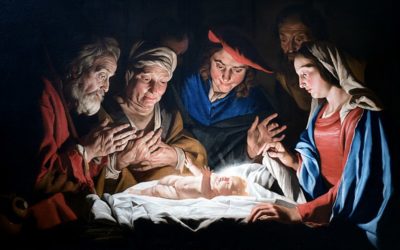The revelation that is now section 93 of the Doctrine and Covenants is one of the most fascinating and revolutionary of all received by Joseph Smith. It reveals characteristics of God the Father and His Son Jesus Christ that had been lost through the centuries. It also reminds us all not to neglect our families in the course of our Church responsibilities.
Historical Background
For a revelation as important as this one, little evidence remains of the circumstances that led to it. The revelation was received by Joseph Smith in Kirtland, Ohio, on May 6, 1833, and was apparently intended immediately for the three members of the First Presidency (Joseph Smith, Sidney Ridgon, and Frederick G. Williams), as well as Bishop Newel K. Whitney. Bishop Whitney wrote that it had two purposes: (1) “chastisement,” and (2) instruction “relative to the Father & Son.”
For additional historical background and doctrinal context, click here.
Faithful to See God
In the first verse of the revelation, the Lord makes a marvelous promise: “Every soul who forsaketh his sins and cometh unto me, and calleth on my name, and obeyeth my voice, and keepeth my commandments, shall see my face and know that I am.” Much of the rest of the revelation describes who He is. He is “the true light that lighteth every man that cometh into the world” (verse 2). He and His Father “are one” (verse 3). He “was in the world and made flesh my tabernacle, and dwelt among the sons of men,” and His Father gave Him “his fulness” (verse 4).
Jesus Progressed to a Fulness
The next set of verses describe how Jesus progressed to the point that the Father gave him “his fulness.”
“In the beginning,” that is, “before the world was,” Jesus was “the Word, even the messenger of salvation” (verses 7‒8). Jesus made “the worlds,” including ours, as well as humans and “all things” (verses 9‒10). He is “the light and the Redeemer of the world; the Spirit of truth, who came into the world, because the world was made by him, and in him was the life of men and the light of men (verse 9).
John the Revelator “beheld his glory, as the glory of the Only Begotten of the Father, full of grace and truth, even the Spirit of truth, which came and dwelt in the flesh, and dwelt among us” (verse 11). John also testified that Jesus “received not of the fulness at the first, but received grace for grace” (verse 12) “until he received a fulness” (verse 13). As Jesus grew in this way and fulfilled His mission, “he received a fulness of the glory of the Father” (verse 16). “And he received all power, both in heaven and on earth, and the glory of the Father was with him, for he dwelt in him” (verse 18.)
Faithful Can Also Grow to a Fulness
In the revelation, the Savior explained, “I give unto you these sayings that you may understand and know how to worship, and know what you worship” (verse 19). In Joseph Smith’s King Follett sermon, the culminating talk before his martyrdom, he said, “If men do not comprehend the character of God, they do not comprehend themselves.”[1]
After the Lord in section 93 explained His own progression to a fulness, He promised: “that you may come unto the Father in my name, and in due time receive of his fulness” (verse 19), a concept largely foreign to people in Joseph Smith’s day. “For if you keep my commandments you shall receive of his fulness, and be glorified in me as I am in the Father; therefore, I say unto you, you shall receive grace for grace” (verse 20).
The Lord explained, “Ye were also in the beginning with the Father” as He Himself was (verse 23). In other words, contrary to the prevailing religious viewpoint in nineteen-century America, humans had a premortal life and were not created out of nothing. They also have a glorious potential: “And no man receiveth a fulness unless he keepeth his commandments. He that keepeth his commandments receiveth truth and light, until he is glorified in truth and knoweth all things. (Verses 27‒28.)
Definition of Truth
The Lord also defined the term “truth”: “Truth,” he said, “is knowledge of things as they are, and as they were, and as they are to come; and whatsoever is more or less than this is the spirit of that wicked one who was a liar from the beginning” (verses 24‒25). Thus, to understand the truth of God and His children, we have to understand their past, present, and future.
Those Born Through Christ Are Church of Firstborn
The Savior tells us in verses 21‒22, “I was in the beginning with the Father, and am the Firstborn, and all those who are begotten through me are partakers of the glory of the same, and are the church of the Firstborn.”
Premortal Life
Turning again to the subject of premortal life, the revelation declares, “Man was also in the beginning with God. Intelligence, or the light of truth, was not created or made, neither indeed can be” (verse 29). It then declares the fascinating doctrine, “All truth is independent in that sphere in which God has placed it, to act for itself, as all intelligence also; otherwise there is no existence” (verse 30).
Eternal Nature of Elements
After discussing intelligence, the revelation goes on to talk about spirit and matter. “For man is spirit,” verse 33 explains. “The elements are eternal, and spirit and element, inseparably connected, receive a fulness of joy.” Conversely, verse 34 adds, “When separated, man cannot receive a fulness of joy.”
These verses seem to say that the fulness of joy God experiences can only be experienced by humans if their spirits and bodies are inseparably joined. This means that the human body is immensely important and sacred, a point reinforced by verse 35: “The elements are the tabernacle of God; yea, man is the tabernacle of God, even temples; and whatsoever temple is defiled, God shall destroy that temple.”
The Glory of God Is Intelligence
After the revelation earlier explains that the intelligence of humans is eternal and not created, verses 36 and 37 declare: “The glory of God is intelligence, or, in other words, light and truth. Light and truth forsake that evil one.”
Through Christ’s Atonement, Children Are Innocent
In a Christian world that saw babies as born in sin, section 93 declares, “Every spirit of man was innocent in the beginning; and God having redeemed man from the fall, men became again, in their infant state, innocent before God. And that wicked one cometh and taketh away light and truth, through disobedience, from the children of men, and because of the tradition of their fathers. (Verses 38‒39).
He then commanded Church members “to bring up your children in light and truth” (verse 40).
Church Leaders Chastened
That commandment about children led to the “chastisement” mentioned by Bishop Whitney in his description of the revelation. In verses 41–53, the Lord commands the members of the First Presidency and Bishop Whitney to put their families in order. The message seems to be that they should not neglect the spiritual welfare of their family members in doing their Church work. They are then to proceed in fulfilling their missions, “and all this for the salvation of Zion” (verse 53).
Credit for the image at top of post: Stock photo, depositphotos.com.



